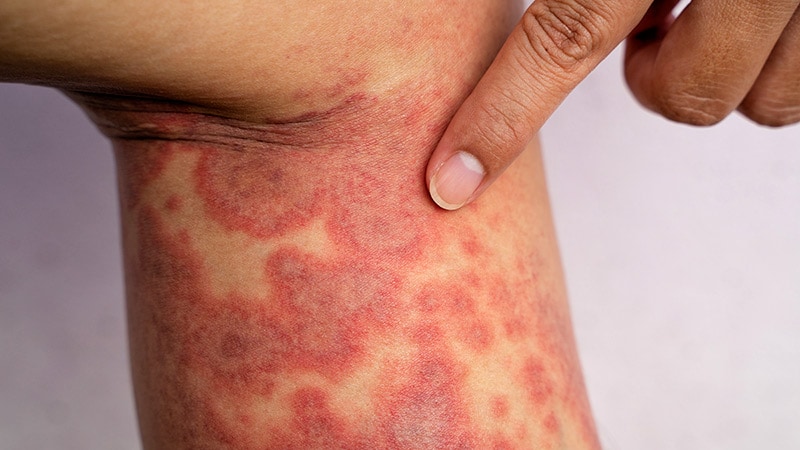TOPLINE:
The introduction of lebrikizumab, a novel monoclonal antibody targeting interleukin-13 for severe atopic dermatitis (AD), was associated with cost savings of approximately €3.3 million over 3 years for the Italian National Healthcare System, according to a budget impact analysis model. The adoption of lebrikizumab increased from 1198 patients in year 1 to 5849 patients by year 3, resulting in cumulative savings through reduced drug acquisition and adverse event management costs.
METHODOLOGY:
- This budget impact analysis model compared two scenarios over 3 years from the Italian National Healthcare System perspective: scenario A with current standard biologic agents (dupilumab and tralokinumab) and scenario B including lebrikizumab alongside existing treatments.
- This analysis included 11,978 patients with severe AD eligible for systemic therapy, with projected growth to 14,973 patients in the first year, 18,716 in the second year, and 23,395 in the third year.
- Market shares for dupilumab, tralokinumab, and, in the intervention scenario, lebrikizumab were applied to the eligible population annually.
- The model incorporated drug acquisition, disease management, and adverse event management costs.
- A one-way sensitivity analysis was conducted to assess the model’s robustness by evaluating the impact of individual parameters with ±20% variation.
TAKEAWAY:
- The implementation of lebrikizumab resulted in an expenditure of €785,594 in the first year, followed by €1,693,126 in the second year and €2,395,402 in the third year, totalling approximately €3.3 million over the 3-year period.
- A market penetration analysis showed that lebrikizumab usage increased from 8% in year 1 to 25% by year 3, whereas dupilumab usage decreased from 74% in year 1 to 59% by year 3 and tralokinumab usage decreased from 18% to 16%.
- Sensitivity analyses revealed that the number of eligible patients and injection site reaction costs were the primary drivers of the cost-saving findings.
- Adverse event management costs decreased by €490,817 cumulatively.
- In scenario B, the number of patients treated with lebrikizumab increased from 1198 in the first year to 5849 in the third year.
IN PRACTICE:
“The introduction of lebrikizumab in Italy could reduce the overall costs for patients with severe AD, who can be treated with biologic agents, in line with AIFA [Italian Medicine Agency] reimbursement criteria. Lebrikizumab is associated with improved patient management and cost saving for the Italian NHS [National Healthcare System]. This data could serve as valuable information for healthcare decision makers to optimize the value derived from the treatment and management of patients with severe AD,” the authors of the study wrote.
SOURCE:
This study was led by Ippazio Cosimo Antonazzo, Research Centre on Public Health (CESP), University of Milano-Bicocca, Monza, Italy. It was published online on July 09, 2025, in Dermatology and Therapy.
LIMITATIONS:
The analysis was based on projected utilisation rates of lebrikizumab, which may not be generalisable to populations with different adoption rates of the drug. The analysis was restricted to monoclonal antibodies and did not include JAK inhibitors, which could have resulted in a different economic impact. Additionally, this study considered only direct medical costs from the Italian National Healthcare System perspective, excluding patient-incurred costs or potential savings from accessing lebrikizumab.
DISCLOSURES:
This study was supported by Almirall S.p.A., Milan, Italy. Several authors reported receiving grants and personal fees and having other ties with various sources. Additional disclosures are noted in the original article.
This article was created using several editorial tools, including AI, as part of the process. Human editors reviewed this content before publication.
Source link : https://www.medscape.com/viewarticle/budget-impact-analysis-shows-cost-savings-lebrikizumab-2025a1000io2?src=rss
Author :
Publish date : 2025-07-17 12:00:00
Copyright for syndicated content belongs to the linked Source.
